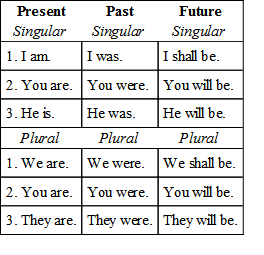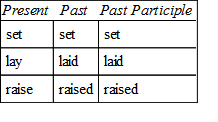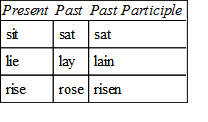 полная версия
полная версияPlain English
186. First, master that little verb be in all its forms. The only way to do this is to commit to memory these forms. Say them over and over until any other form does not sound right.


187. Do not use aint for is not or am not. Do not say, He aint here, or I aint going. Say, He isn't here; I am not going.
A FREQUENT MISTAKE
188. Perhaps one of the most frequent mistakes is the confusion in the use of the past time form and the past participle. Remember that the past time form is never used except in expressing past time; never use it in forming a verb phrase. Take the verb do, for example—say, He did the work, never, He done the work; but we should say, He has done the work, never, He has did the work. Say and seen are confused in the same manner. Watch this carefully.
Exercise 1
Underline the correct word in the following:
1. Who did—done it?
2. He sung—sang well.
3. He sunk—sank before we could reach him.
4. She written—wrote him a letter.
5. He taken—took the book.
6. They swum—swam the river.
7. I saw—seen him do it.
8. They drank—drunk too much.
9. He soon began—begun to fail.
10. The lad ran—run home.
11. They come—came yesterday.
WITH HELPING VERBS
189. Never use the past time form with the helping verbs has, had, was and were. Always use the past participle. Watch this carefully. For example, never say, He has went. Went is the past time form. Say, He has gone.
Exercise 2
Underscore the correct word in the following sentences:
1. He had tore—torn the book.
2. Have you ever sang—sung this tune?
3. They have showed—shown us how to win.
4. She has went—gone away.
5. The trees were shook—shaken by the wind.
6. He was chose—chosen for leader.
7. He has rose—risen from the ranks.
8. It was wrote—written by him.
9. He has took—taken the prize.
10. He was gave—given the money.
11. I have forgot—forgotten the rule.
12. The river was froze—frozen over.
13. The machine was broke—broken.
14. It was wore—worn out.
15. The meal was ate—eaten in silence.
PAST TIME FORMS
190. Watch your speech to see if you use an incorrect verb form for the past time form. Study the table of irregular verbs and refer to it frequently. We often make the mistake of forming the past time form by adding ed when properly it is formed irregularly. For example: we often say drawed for drew, throwed for threw, etc.
Exercise 3
Draw a line under the correct form in the following:
1. He grew—growed rapidly.
2. He knew—knowed better.
3. He catched—caught the ball.
4. He drew—drawed the water.
5. They threw—throwed him over.
6. I drinked—drank the water.
7. I climbed—clumb the tree.
8. I seed—saw him do it.
9. She teached—taught school.
VERBS OF SIMILAR FORM
191. Do not use one verb for another of similar form but different meaning. The following are the most common of these:
Lay (incomplete verb, requires an object) meaning to place or to put; as, to lay the book down. Principal parts: Present, lay; Past, laid; Past participle, laid.
Lie (complete verb, takes no object) meaning to recline, to rest; as, to lie in bed. Principal parts: Present, lie; Past, lay; Past participle, lain.
Set (incomplete verb, requires an object) meaning to place or to put; as, to set the table. Principal parts: Present, set; Past, set; Past participle, set.
Sit (complete verb, takes no object) meaning to rest, as, to sit in a chair. Principal parts: Present, sit; Past, sat; Past participle, sat.
Raise (incomplete verb, requires an object) meaning to cause to rise, to lift up. Principal parts: Present, raise; Past, raised; Past participle, raised.
Rise (complete verb, takes no object) meaning to get up, to ascend. Principal parts: Present, rise; Past, rose; Past participle, risen.
192. NOTE—These three verbs need an object to complete their meaning:

193. NOTE—These three verbs need no object:

Exercise 4
Fill in the following blanks with the correct form of the verbs sit, set, lay, lie, raise and rise:
1. I......it on the table and there it.......
2. They......the battle ship, Maine.
3. Where did you......it?
4. A mile of pipe has been.......
5. The miners......a large strike fund.
6. She......down to sleep.
7. The body......in state three days.
8. The farmers of the U. S.......an enormous wheat crop.
9. The city......on the right bank.
10. We have......the corner stone.
11. When wages are......, prices are......too.
12. He......in bed all morning.
13. ......down Fido.
14. The sun......at six this morning.
15. She has been......there all day.
16. The ship......to during the storm.
17. They have been......new tracks.
18. The hen is......on the eggs.
19. Somebody said, "Early to bed and early to......, makes a man healthy, wealthy and wise."
20. He......motionless for an hour.
21. He......out the trees in rows.
22. He will......in his position.
23. The court will......in May.
24. Where did he......?
25. She......the table while he......there.
26. He......the clock for six o'clock.
27. The water has......two feet since the rain.
28. He......the book down and......on it.
29. The hen has been......a week.
30. ......it on the table.
31. He......in the shade and watched her......the plants.
COMMON ERRORS
194. Remember that in the present time form the third person singular takes the s-form, but the s-form is never used except with the third person singular. We often make the mistake of using the s-form with a plural subject. Notice carefully the following sentences, and correct the errors. All of the sentences are wrong.
1. The days is getting shorter.
2. The men has struck.
3. The trains was late.
4. These papers is written for you.
5. You was disappointed, wasn't you?
6. There is several coming.
7. The nights was dark and cloudy.
8. The clouds has gathered.
9. They was anxious to come.
195. When two subjects are connected by and, the s-form of the verb must not be used, unless both subjects refer to one person; as:
The president and the secretary (two persons) were late.
The president and secretary (one person) was elected.
196. But when the two subjects are connected by or or nor then use the s-form of the verb; as:
Neither Germany nor Russia admits a war of offense.
Either the House or the Senate rejects the bill.
197. Never use the infinitive sign to by itself; as:
I have not written and do not expect to.
He has not gone nor does he intend to.
198. Never use don't for doesn't. The use of don't for doesn't is a very common mistake. Don't is a contraction of do not and doesn't of does not. When you are in doubt as to which to use, think or speak the two words in full and see if the verb agrees with the subject. Do not is used with a plural subject, and does not with a singular subject. For example: He don't believe me. This sentence in full would be, He do not believe me, which is incorrect. He does not (doesn't) believe me is correct. Or, They doesn't believe me. This sentence in full would read, They does not believe me, which is incorrect. They do not (don't) believe me is correct.
199. Do not use has got, or have got for must. For example, do not say, We have got to go. Say, We must go. Not, He has got to do what I say; but, He must do as I say.
200. Do not say had ought. For example: You had ought to know better. Omit the had; it is unnecessary and incorrect. Say, You ought to know better.
201. Do not say says I or thinks I.
Says I, "Will you go?"
Says he, "That's what will happen."
Thinks I to myself, "I'll show you."
These are incorrect. Say instead:
I said, "Will you go?"
He said, "That's what will happen."
I thought, "I'll show you."
Exercise 5
Mark all the verbs in the following quotations and note carefully their use.
1. Speak properly and in as few words as you can but always plainly; for the end of speech is not ostentation but to be understood.—Penn.
2. "Freedom's battle, once begun,Bequeathed from bleeding sire to son,Though baffled oft, is ever won."Note the use of may and can in this quotation:
3. Knowledge cannot be stolen from us. It cannot be bought or sold. We may be poor, and the sheriff may come and sell our furniture, or drive away our cow, or take our pet lamb and leave us homeless and penniless; but he cannot lay the law's hand upon the jewelry of our minds.—E. Burritt.
Note the use of shall and will and would and should in the following. Richard Grant White says: "I do not know in English literature another passage in which the distinction between shall and will and would and should is at once so elegantly, so variously, so precisely, and so compactly illustrated."
4. "How long I shall love him I can no more tell,Than, had I a fever, when I should be well.My passion shall kill me before I will show it,And yet I would give all the world he did know it;But oh how I sigh, when I think, should he woo me,I cannot refuse what I know would undo me."5. I want it said of me by those who know me best that I always plucked a thistle and planted a flower where I thought a flower would grow.—Abraham Lincoln.
Exercise 6
Note the nouns as well as the verbs in the following quotation. Note also the use of infinitives and participles. Mark every verb and use it in a sentence of your own.
Faith and Truth
You say "Believe;" I say "Trust."
Between those two words is a great gulf fixed.
The idea that there can be a moral obligation to believe external facts is unworthy of a freeman, but to trust is as much the true nature of man as it is that of a babe to draw in its mother's milk.
You say "Creed;" I say "Faith."
A creed at best is but a sorry caricature of a faith.
Faith is the proper atmosphere of man, trust is his native buoyancy, and his only obligation is to follow the highest law of his being.
You have one supreme duty above all creeds and conventions—namely, to think honestly, and say what you think.
Have you doubts about your creed? say so; only thus has the true faith ever advanced.
It is not God, but the devil, who whispers: "Think at your peril!"
Do you see flaws in the ancient structure of respectability and law and order? Say so; only thus has the condition of man ever improved.
Have courage to be the heretic and traitor that you are by nature, and do not worry about the consequences.
Be a creator, as you were born to be, and spurn beyond all infamies the wretched role of a repeater and apologist.
The world lives and grows by heresy and treason.
It dies by conformity to error and loyalty to wrong.
Ernest Crosby.Exercise 7
In the following paragraph, the predicates are printed in italics, and the participles and infinitives in italic capitals. Study carefully.
If it were taught to every child, and in every school and college, that it is morally wrong for anyone TO LIVE upon the COMBINED labor of his fellowmen without CONTRIBUTING an approximately equal amount of useful labor, whether physical or mental, in return, all kinds of GAMBLING, as well as many other kinds of useless occupations, would be seen TO BE of the same nature as direct dishonesty or fraud, and, therefore would soon come TO BE CONSIDERED disgraceful as well as immoral. Alfred Russel Wallace.
Exercise 8
Underscore all the verbs in the following and note the participles, the infinitives and the various time forms; also the helping verbs:
What, speaking in quite unofficial language, is the net purport of war? To my knowledge, for example, there dwell and toil, in the British village of Dumrudge, usually some five hundred souls. From these, by certain 'natural enemies' of the French, there are selected, say thirty able-bodied men; Dumrudge, at her own expense, has suckled and nursed them; she has, not without difficulty and sorrow, fed them up to manhood and trained them in the crafts, so that one can weave, another build and another hammer. Nevertheless, amidst much weeping and swearing, they are selected; all dressed in red and shipped away, at the public charges, some two thousand miles, or, say only to the south of Spain, and fed there till wanted. And now to that same spot in the south of Spain are thirty similar French artisans, in like manner, wending their ways; till at length the thirty stand facing the thirty, each with his gun in his hand. Straightway, the word 'Fire' is given, and they blow the souls out of one another; and in the place of the sixty brisk, useful craftsmen, the world has sixty dead carcasses, which it must bury and anew shed tears for.
Had these men any quarrel? Busy as the devil is, not the smallest! They lived far enough apart; were the entirest strangers; nay, in so wide a universe, there was even, unconsciously, by commerce, some mutual helpfulness between them.
How then?
Simpleton! Their governors had fallen out; and instead of shooting one another, had these poor blockheads shoot. —Carlyle.
SPELLING
LESSON 11
There are but few rules which can be learned to aid in the spelling of English words. The spelling of words must be largely mastered by concentration and effort of the memory. It will help you to memorize the correct spelling if you will write each word a number of times. This gives you a visual image of the word. Then spell it aloud a number of times. This will give you an auditory image.
Words which you find difficult to master, write in a list by themselves and review frequently. There are a few rules, however, which are helpful to know. There is one rule of spelling we want to learn this week concerning words formed by adding a suffix.
A word of one syllable which ends in a single consonant before which stands a single vowel, doubles the final consonant when a suffix beginning with a vowel is added.
For example: mat, matted, matting; sun, sunned, sunning.
Mat ends in t, a single consonant which is preceded by the single vowel a,—so you double the t when you add the suffix ed or ing, which begin with a vowel.
Notice these: Blend, blended, blending; Help, helped, helping.
These words do not end in a single consonant, so you do not double the consonant.
Notice also: Lean, leaned, leaning; Rain, rained, raining.
These words end in a single consonant, but before the consonant is a double vowel, ea in lean and ai in rain. So we do not double the final consonant.
This same rule holds true of any suffix, beginning with a vowel, as er and est, for example: sad, sadder, saddest. Slim, slimmer, slimmest.
Learn to spell the following words. Add the suffixes ed and ing to the words for Monday, Tuesday and Wednesday. Add er and est to the words for Thursday, Friday and Saturday.
Monday
Chat
Cheat
Grin
Groan
Suit
Tuesday
Sap
Soap
Bet
Beat
Rot
Wednesday
Talk
Teach
Gain
Stir
Plan
Thursday
Thin
Dear
Flat
Cheap
Straight
Friday
Clean
Brief
Fair
Shrill
Wet
Saturday
Strong
Great
Mad
Fleet
Fat
PLAIN ENGLISH
LESSON 12
Dear Comrade:
In this lesson we are beginning the study of still another part of speech. You will notice that in words, at least, we give credit and place in society only because of work performed. In the society of men, people are given place and position too often because of outward dress and form or because of some special privilege. They are not given their place in society because of the work which they do or because they perform any useful function. In fact, in our topsy-turvy world, those who perform no work at all, but are simply parasites upon society, have claimed for themselves the best of everything and the highest positions.
Surely some time we shall see a society as successfully organized as our society of words, when men will be received, not because of that which they possess, but because of that which they do and are. Man has really laid the foundation for an ideal commonwealth in his organization of words into a spoken and written language.
When we think back across the centuries and think of the primitive man as he dwelt in trees to protect himself from the wild animals, we wonder what sort of speech he used then. Possibly it was only a little more articulate than the speech of some animals.
But man had within him the instinct to question, and this has been the root of all his progress. We can imagine these primitive men witnessing the wonder of fire, as the terrible unknown god of the lightning set fire to the forest in which they lived; but after the fear had subsided, some adventurous, inquiring forefather of ours ventured near the ashes, and began to investigate concerning this fearful and wonderful thing.
So gradually they discovered the use of fire, and with it a wonderful new future opened before the primitive man. With these great discoveries, he needed a better form of communication with his comrades, so articulate speech developed. But when we go back into the beginning of written speech, it is difficult for us to trace it to its beginning.
The first evidence we find was of man as a sign maker. On the walls of caves in France and Belgium and here in America, we have found rude sketches which the scientists tell us date back to the Ice Age and the Old Stone Age. Here the primitive man has drawn for us crude pictures describing different phases of his life, the animals about him, the hunt and the chase, and in these pictures we find the very beginning of our alphabet of to-day.
How much more wonderful it makes our spoken and written language to know that man has developed it himself. It has not been handed down by some god or powers above; but the spirit of rebellion against the things that be; the great desire to know more and to find out the reason why of all the things around us,—these have been the forces that have led the race from the animal-like beings that lived in trees to the race of today that understands in a large measure the laws that govern life.
It is only as we, through this spirit of rebellion, this same divine discontent with the things that are, seek to do our own thinking that we can add our share to the heritage of the race. Let us have the same courage that must have inspired the heart of that primitive man who dared to venture and inquire concerning the fearful things of nature round about him. Let us think for ourselves. Ask always the question "why" and demand the reason for all things. Thus we shall free ourselves and help to free the race.
Yours for Education,THE PEOPLE'S COLLEGE.IN PLACE OF A NOUN
202. You remember in our study of the parts of speech we found that we have one part of speech that can be used in place of a noun. This is a very helpful part of speech for it saves us a great deal of tiresome repetition. Notice the following sentences:
John Smith is a machinist.
John Smith works at the machine.
The machine is John Smith's master.
This is awkward and the repetition is tiresome. So we say instead:
John Smith is a machinist.
He works at the machine.
It is his master.
You readily understand who and what we mean by he and it and his, and we will all agree that the latter is a much better way of making the statements. These words like he and his and it, which we use in place of the noun, we call pronouns. Pro means literally in the Latin, for or in place of; so when we say pronoun we are practically saying, in place of a noun.
A pronoun is a word that is used in place of a noun.
203. The word for which a pronoun stands or the noun in whose place it is used is called its antecedent. Ante means before and cedent comes from the Latin word meaning go, hence antecedent means literally, going before.
Notice this sentence: The manager spoke to the men before he left and told them to stop at the office. Manager is the antecedent of the pronoun he, and men is the antecedent of the pronoun them.
The word for which a pronoun stands is called its antecedent.
KINDS OF PRONOUNS
204. The Latin language has had a great deal of influence upon English. Many of our words are taken from the Latin. You remember that all of the names of our parts of speech are derived from Latin words. We also feel the influence of the Latin language in the way in which we number our personal pronouns. The Romans naturally thought that one would think of one's self first, and so the pronouns referring to one's self, or the person speaking, are called the first person pronouns. They are, I, my, mine, me and we, our, ours, and us.

